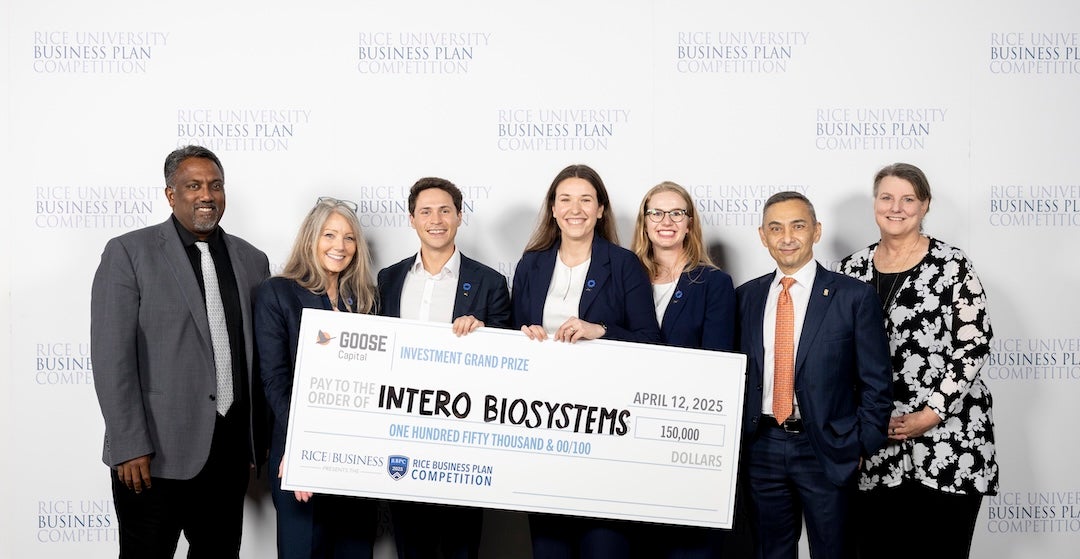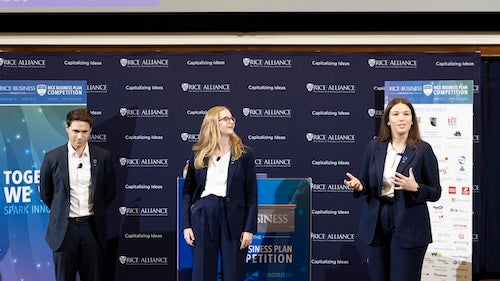Intero Biosystems — a life science company that has developed the first cell-derived human “minigut” replicating cell types, spatial structure and function of the human intestine — took home the grand prize at the 2025 Rice Business Plan Competition. The company’s product, Gastroscreen, includes the intestinal lining and supporting tissues, creating a complete mini-organ “in a dish” for comprehensive safety and efficacy testing.
The RBPC is the world’s largest and richest intercollegiate student startup competition and is hosted annually by the Rice Alliance for Technology and Entrepreneurship. In honor of the business school’s 50th year, the competition’s 25th year and its contribution to the school’s strong reputation for entrepreneurship, Rice Business was the presenting sponsor of the event.
“For 25 years, the Rice Business Plan Competition has helped shape how Rice Business shows up in the world by creating a platform where student-entrepreneurs can tackle some of the most complex challenges of our time in energy, in health care, in technology and beyond,” said Peter Rodriguez, dean of Rice Business. “If we’re serious about changing the world — and I believe we are — then it’s our responsibility to open doors for students everywhere to imagine bold solutions and build what comes next.”

Since 2001, the RBPC has offered students real-world experiences and insights into what it takes to craft a business strategy and successfully launch a company. Participants compete not only for cash but for investments and in-kind prizes. While each team left the competition with cash in hand, the spirit of the event lies in the mentorships and connections formed among students, investors and experienced entrepreneurs. During the competition’s 25 years, 910 startups have raised more than $6.9 billion in capital.
The three-day event took place at both McNair Hall and the Ion, the hub of Houston’s innovation district powered by Rice. The competition included an elevator pitch competition, practice round, semifinals and wildcard and final rounds. Between pitches, RBPC teams enjoyed networking and mentorship opportunities, gaining applicable knowledge for their startups. Four hundred judges, including active investors, successful entrepreneurs and other members of the Houston business community, contributed this year — marking the largest judge participation in the competition’s history. Winners were announced at the company showcase and awards ceremony in downtown Houston April 12.
“Over the past quarter century, this competition has grown into the largest and richest student startup competition in the world, but even more importantly, it has become a symbol of Rice’s deep commitment to bringing innovation to life,” Rice President Reginald DesRoches said during his remarks at the awards celebration. “At Rice, we believe that ideas are just the beginning. Our mission is to foster an environment where bold ideas are not only imagined but nurtured, tested and brought into the world to have real impact.”
This year’s 42 graduate student-led startups were selected from 550 applicants — the event’s largest applicant pool to date — and represented 34 universities across four countries. Teams pitched their cutting-edge solutions in categories including energy, cleantech and sustainability; life sciences and health care; hard tech; digital enterprise; and consumer products. Read more about the competing startups here.
Based on the judges’ overall scores, the seven finalists were:
- Intero Biosystems, University of Michigan — first place and the $150,000 Goose Capital Investment Grand Prize with a total of $902,000 in prizes.
- Intero Biosystems has developed GastroScreen, the first stem cell-driven human “mini gut” that is ideal for organ function testing before testing on humans.
- Intero Biosystems has developed GastroScreen, the first stem cell-driven human “mini gut” that is ideal for organ function testing before testing on humans.
- MabLab, Harvard University — second place and the $100,000 Investment Prize, sponsored by David Anderson, Anderson Family Fund, Jon Finger and Finger Interests, with a total of $301,500 in prizes.
- MabLab has created the first rapid test capable of detecting multiple adulterants in laced drugs and spiked drinks.
- MabLab has created the first rapid test capable of detecting multiple adulterants in laced drugs and spiked drinks.
- Re.Solution, RWTH Aachen University — third place and the $50,000 Investment Prize, sponsored by David Anderson, Anderson Family Fund, Jon Finger and Finger Interests, with a total of $76,500 in prizes.
- Re.Solution is revolutionizing polyester recycling with its water-based technology that works without generating salt waste, making textile recycling viable.
- Re.Solution is revolutionizing polyester recycling with its water-based technology that works without generating salt waste, making textile recycling viable.
- Pattern Materials, Rice University — fourth place and the $5,000 prize, sponsored by Norton Rose Fulbright, with a total of $134,500 in prizes.
- Pattern Materials’ laser-induced graphene technology is a simple one-step process that can be rapidly performed, thereby enabling low-cost scalable production.
- Pattern Materials’ laser-induced graphene technology is a simple one-step process that can be rapidly performed, thereby enabling low-cost scalable production.
- Xatoms, Western University and University of Toronto — fifth place and the $5,000 prize, sponsored by EY, with a total of $30,000 in prizes.
- Xatoms has built the world’s largest AI- and quantum-driven platform for discovering solar-activated semiconductor materials.
- Xatoms has built the world’s largest AI- and quantum-driven platform for discovering solar-activated semiconductor materials.
- Mito Robotics, Carnegie Mellon University — sixth place and the $5,000 prize, sponsored by Chevron Technology Ventures.
- Mito Robotics is accelerating life science research by automating manual cell culture with artificial intellegence-powered robotic scientists.
- Mito Robotics is accelerating life science research by automating manual cell culture with artificial intellegence-powered robotic scientists.
- FarmSmart.ai, Louisiana State University — seventh place and the $5,000 prize, sponsored by Shell Ventures, with a total of $106,000 in prizes.
- FarmSmart.ai is an AI — agriculturally intelligent — driven assistant that synthesizes vast agricultural research into actionable tailored intelligence.
Additional significant prizes and the winnings teams include:
- $250,000 Goose Capital Investment Prize — Intero Biosystems, University of Michigan
- $150,000 Goose Capital Investment Prize — GreenLIB Materials, University of Ottawa
- $200,000 The OWL Investment Prize — Intero Biosystems, University of Michigan
- $100,000 The OWL Investment Prize — FarmSmart.ai, Louisiana State University
- $100,000 Houston Angel Network Investment Prize — Intero Biosystems, University of Michigan
- $100,000 The Indus Entrepreneurs (TiE) Texas Angels Investment Prize — MabLab, Harvard University
- $100,000 nCourage Investment Network’s Courageous Women Entrepreneur Investment Prize — Intero Biosystem, University of Michigan
- $25,000 nCourage Investment Network’s Courageous Women Entrepreneur Investment Prize — X atoms, Western University and University of Toronto
- $25,000 nCourage Investment Network’s Courageous Women Entrepreneur Investment Prize — MabLab, Harvard University
- $100,000 Investment Prize from Nancy Chang — Intero Biosystem, University of Michigan
- $50,000 Valhalla Investment Network Investment Prize —Pattern Materials, Rice University
- $50,000 Valhalla Investment Network Investment Prize —MabLab, Harvard University
- $25,000 Pearland EDC Spirit of Entrepreneurship Cash Prize — Re.Solution, RWTH Aachen University
- $25,000 Pearland EDC Spirit of Entrepreneurship Cash Prize — Pattern Materials, Rice University
- $25,000 New Climate Ventures Sustainable Investment Prize — Pattern Materials, Rice University
- $25,000 NOV Golden Ticket to Supernova Accelerator and Cash Prize — Nanoborne, University of Texas at Austin
- $25,000 Southwest National Pediatric Device Consortium Pediatric Device Cash Prize — Microvitality, Tufts University
- $25,000 Amentum and WRX Companies Rising Stars Space Technology and Commercial Aerospace Cash Prize — Pattern Materials, Rice University
- $25,000 The Eagles Investor Investment Prize — MabLab, Harvard University
- TMC Innovation Healthcare Accelerator Bootcamp Invitation Prize — Intero Biosystems, University of Michigan
All finalists are awarded the Baker Botts In-Kind Legal Services Prize.
To learn more about the 2025 Rice Business Plan Competition, visit rbpc.rice.edu.

